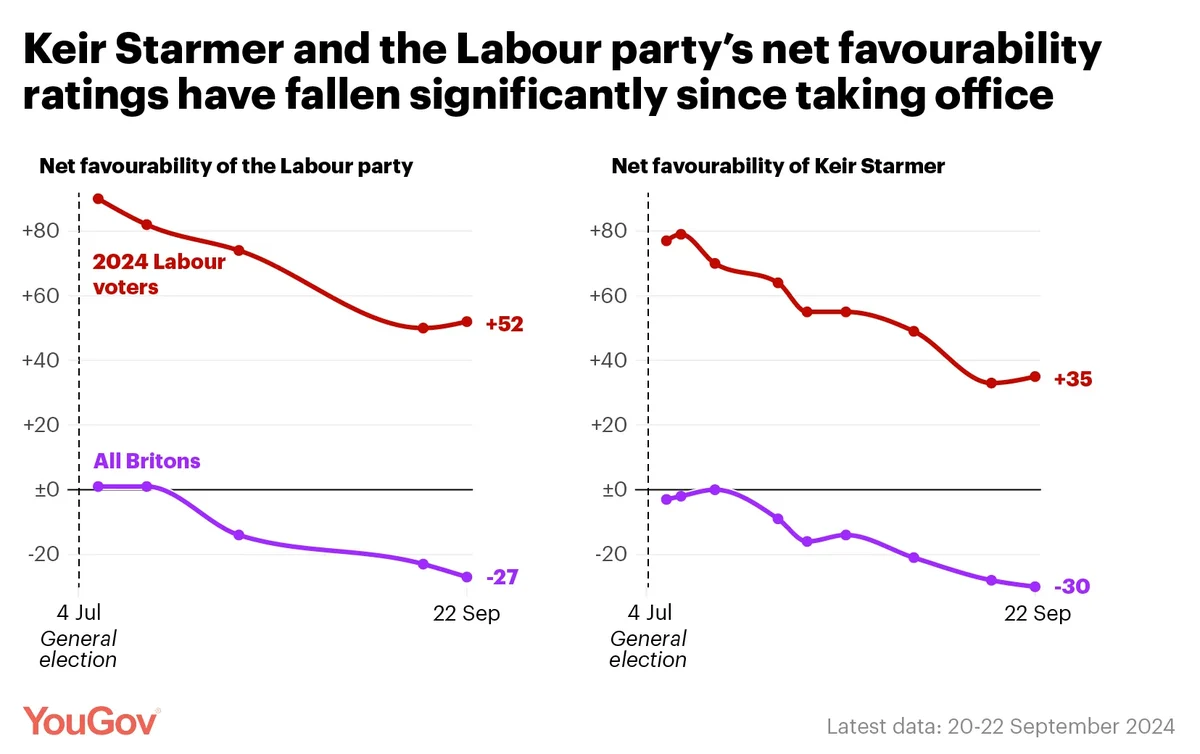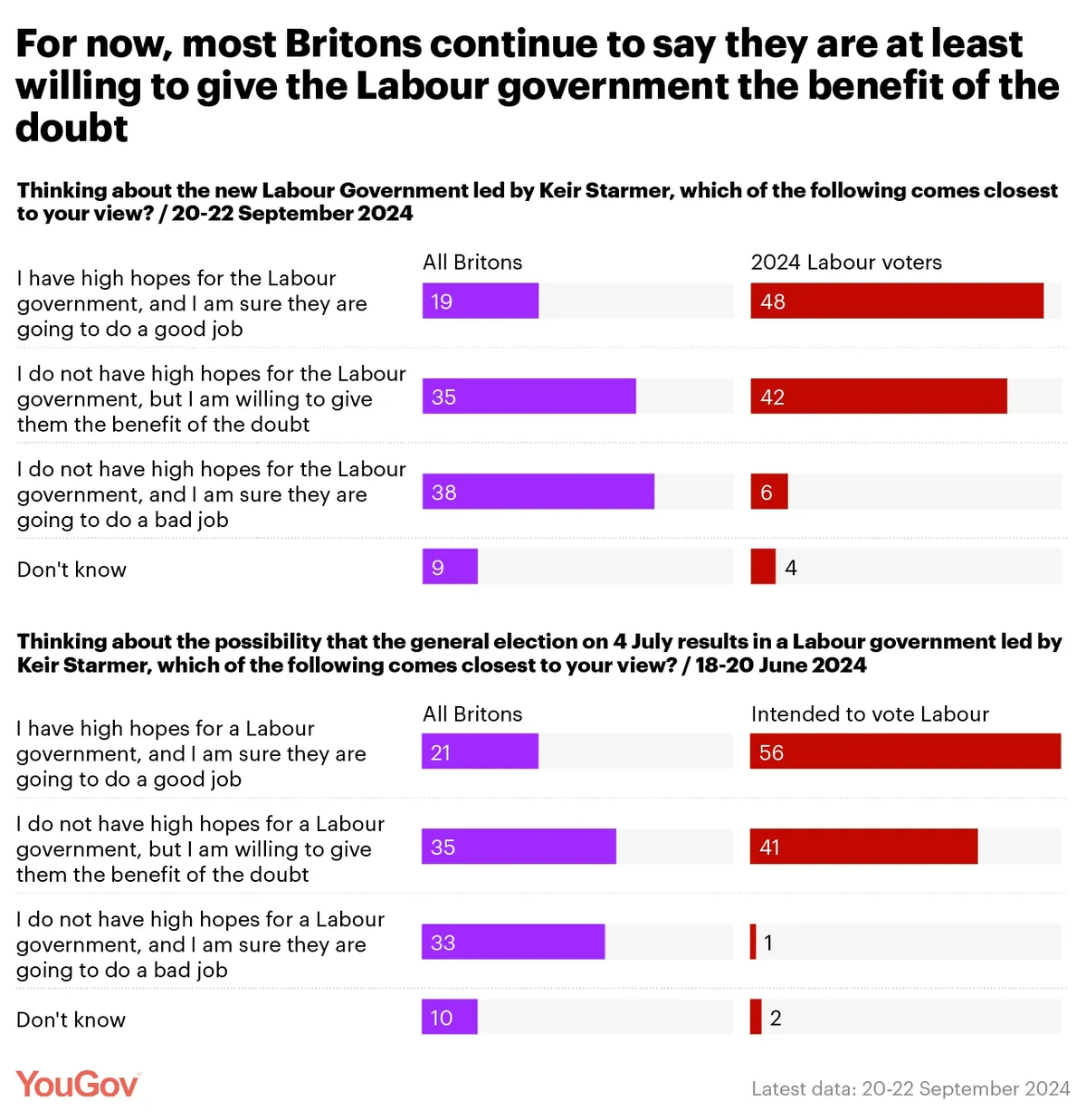One in four Britons say they thought Labour would do well, but have been disappointed, with the winter fuel allowance changes being a key reason why
Despite achieving an election victory almost on the scale of Tony Blair’s 1997 landslide two and a half months ago, the new Labour government under Keir Starmer is already unpopular.
According to the latest YouGov tracker data, Labour’s net favourability rating has plummeted from +1 immediately after the election to -27 now. Keir Starmer’s own ratings have sunk from -3 to -30, and a YouGov poll for The Times shows that 53% of Britons say he is doing a bad job as prime minister – including 22% of Labour voters.

Our tracker data shows that only 23% of Britons approve of the government’s record so far, compared to 53% who disapprove.
On specific policy areas there is likewise net disapproval across all 15 areas we ask about. Views of the government are most negative when it comes to immigration – only 16% have a positive view while 67% have a negative one. More worryingly for Labour, their job performance on the key issue of the NHS – the area Britons are most likely to say they should prioritise – is almost as bad, with 64% saying they are managing the health service badly and 19% well.
With Labour having not yet been in office for three months, these results may primarily reflect attitudes to the government more broadly for the time being. If instead we look across a clutch of specific actions the Labour government has taken since coming to office, the results prove more of a mixed bag.
Despite significant opposition from many within his party, Keir Starmer’s decision to keep the child benefit cap set to two children has earned the public’s approval, with 61% backing the call. An identical number also approve of the government agreeing new pay deals with striking junior doctors.
Likewise, most of the public back Labour’s decision to lift the ban on onshore wind farms in England (57%) and to suspend some arms sales to Israel (55%).
More controversial has been the pay deal the government reached with striking train drivers, which 45% approve of but 43% disapprove of, while most people are against the government’s changes to the winter fuel allowance for pensioners (57%) and particularly the decision to release prisoners early in order to avoid jail overcrowding (70%).
Why do many Britons feel let down by Labour?
With Labour’s ratings on our trackers having taken a knock, a separate new YouGov survey shows that a quarter of Britons (23%) say of the new government “I expected them to do well, but I have been disappointed”. This is twice the number who said “I expected them to do well, and they have done well” (11%), with only an additional 3% saying they expected the party to do poorly but have been pleasantly surprised.
Labour voters in particular are likely to feel like they have been let down – 36% say they expected better, which is actually the most common answer among this group (29% say they had positive expectations which are being met).
In fact, YouGov data in a survey conducted for The Times last week shows that one in seven Labour voters (14%) go so far as to say that they regret having voted for the party.
So why do people feel let down by Labour? We asked the quarter of the population who said they had expected Labour to do well, but think they have done badly so far, to tell us in their own words the main or biggest reason they feel this way. We then used our AI-powered Topic Quantifier model to categorise these responses.
Coming top is Labour’s decision to make Winter Fuel Payments for pensioners means tested, which 28% of those who say they feel let down by the party so far specifically give as their biggest reason why.
Not unconnected is the belief that pensioners and those on low incomes are shouldering the burden of Labour’s first policy announcements, which 16% of those disappointed by Labour point to as their primary reason for feeling so.
A further 13% cite wrong priorities on the part of the government, while a further 9% say that Labour isn’t hasn’t made enough progress in addressing the country’s issues yet.
Looking forward, most Britons are still willing to give Labour the benefit of the doubt
While Labour has certainly made a poor first impression with the public, it can take some heart in the finding that most Britons are still at least willing to give them the benefit of the doubt. Half way through the general election campaign, we found that 21% of Britons said they had high hopes for a Labour government and thought that it would do well, while 35% said that although their expectations were not high, they were willing to give Keir Starmer the benefit of the doubt.
Our latest data shows these figures largely unchanged – 19% still say they have high hopes and good expectations, while 35% continue to say they will give the party the benefit of the doubt.

Likewise, the public do see the new government as a marked shift from its predecessor – 53% of all Britons consider Starmer and co to be a “major” or “fair” change from Sunak and the Tories, including 78% of those who voted for Labour in July.
So while the public has been disappointed by the Labour government so far, their attitudes have not yet crystallised. Keir Starmer still has some time to bring the public on side; in a poll during the election campaign, only 10% of Britons said they thought that much could be achieved in the first 100 days after the general election. The one year mark is more important: 43% of Britons and 58% of those who were intending to vote Labour believed a great deal or fair amount of progress could be made towards fixing the UK’s problems by July 2025.
See the full results here and here
What do you think Keir Starmer, the Labour government's actions since coming to office, and everything else? Have your say, join the YouGov panel, and get paid to share your thoughts. Sign up here.
Photo: Getty








